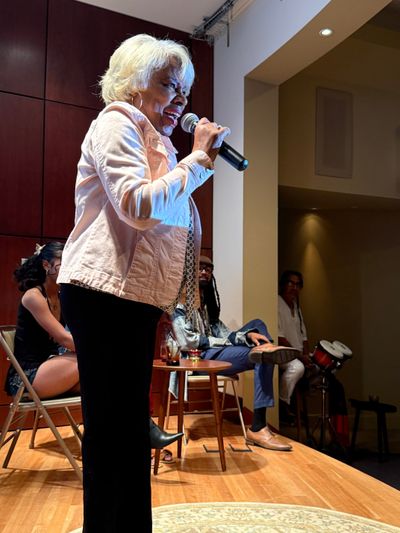Mona Lake Jones got her start as a renowned poet at the urging of Essence magazine in 1990. But truly, it was the nurture of Calvary Baptist Church and the Black Spokane community she grew up in during the 1940s and 1950s that gave her the sense of value, confidence, and cultural grounding we now hear in her warm, expressive delivery of poetic verse. Her words are like a balm – soft, wise and affirming – a salve to the soul of Black identity.
On June 27, at the second annual Our Stories event at the Northwest Museum of Arts and Culture, Jones offered grace and affirmation during the poetry hour, a radiant moment of multigenerational connection. Now 85 years old, she stands as the Seattle and King County Poet Laureate and is often called “the Maya Angelou of the Pacific Northwest.”
When asked what it was like to grow up Black in Spokane, she describes an intimate and affirming community. “It was a loving and embracing environment – my mama, my daddy, my church, the Masons and Eastern Stars, the Wednesday Art Club. I was affirmed and felt valued.” That sense of belonging, she adds, gave her early pride in herself, but also a sharp contrast: “Outside of that community, it was treacherous waters. We were restricted in where we could live, what clubs we could join.” Jones is a 1957 graduate of Lewis and Clark High School, an environment much different from the nurture of this community from which she drew affirmation and rested in familiarity.
It was Calvary Baptist Church that served as her first stage and greatest mirror. “I said my first Easter poem at church and forgot two, three lines – but they said, ‘Go on, girl, you got it!’” Her father, also a poet, would give her poetry books each birthday and read aloud to her. That foundational affirmation shaped her love for words.
When she began writing, her joy in Blackness was often misunderstood outside her community. “I could tell that when I said something that brought folks joy about themselves and about me, I had a little something going.” That “little something” caught the ear of Susan Taylor, editor of Essence magazine; Jones made quite an impression – leading to her first published poem (at Taylor’s urging) and a decades-long literary journey that now includes five books.
In her work, the kitchen holds special symbolism – a hallowed space in many Black families, where stories are passed down or dance steps are shared, and emotional nourishment is served alongside food. “The kitchen is the gathering place. Doesn’t matter how fancy your house is.” Jones asserts something so many Black people can relate to in the spaces of congregation in family homes–if you can give food for thought in your kitchen, you’re doing something right.
She also reflects on how children watch their elders and absorb far more than words. “They’re learning from us even when we’re not thinking we’re teaching. They’re watching how we resolve issues, how we treat others.” In her book, she writes, “Sometimes it frightens me to see myself in my children, because I know I haven’t always acted wisely.” Still, she believes our modeling can give young people the resilience they need to navigate the world.
When asked to compare the safety and validation she felt as a youth within the village that raised her to how today’s Black youth can feel safe and Black – amid racism, internalized inferiority, and convoluted messages about identity and cultural worth – Jones didn’t hesitate. She acknowledged the challenges of growing up in a media-saturated world full of harmful rhetoric about Black identity, but offered a clear vision for helping youth feel safe and unapologetically Black:
“The key is having an adult, a parent, or someone significant – a teacher, a mentor – who can undo the negative messages that kids are bombarded with. Somebody has to help with their resiliency. And I do find that our Black kids can be so resilient. But they have to have help. They have to learn that they are already winners because nobody can beat them at being themselves.”
It’s that kind of wisdom – spoken plainly, with heart – that makes Mona Lake Jones an elder of lasting significance. She’s proof that when Black children are loved, protected, and affirmed, they grow into storytellers, visionaries, and griots of grace.
